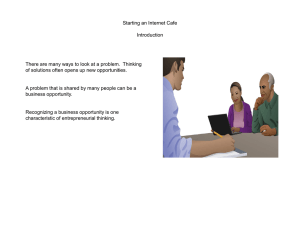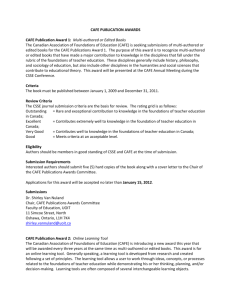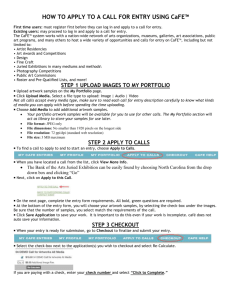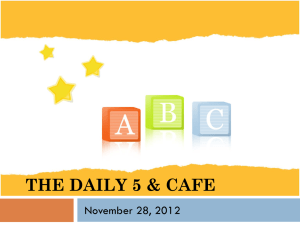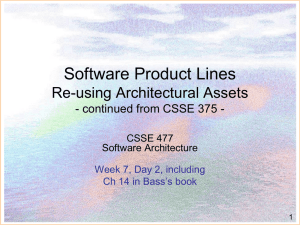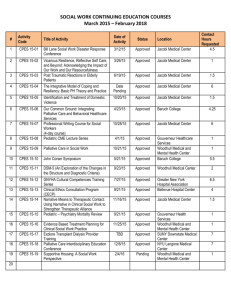CAFE President`s Report 2012
advertisement
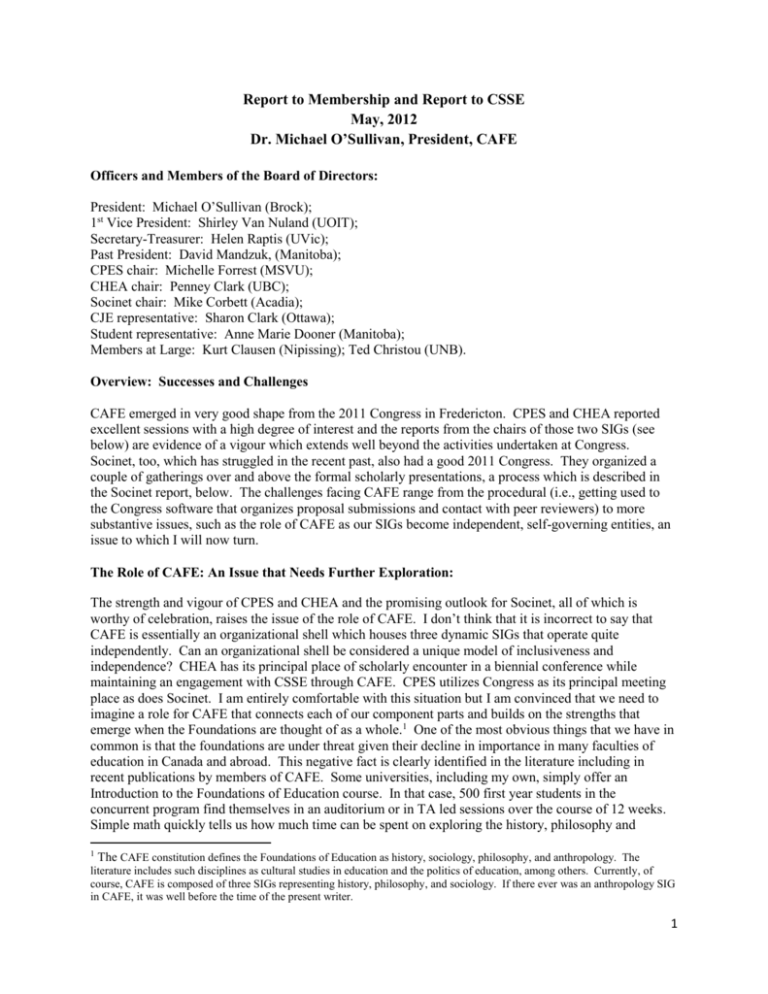
Report to Membership and Report to CSSE May, 2012 Dr. Michael O’Sullivan, President, CAFE Officers and Members of the Board of Directors: President: Michael O’Sullivan (Brock); 1st Vice President: Shirley Van Nuland (UOIT); Secretary-Treasurer: Helen Raptis (UVic); Past President: David Mandzuk, (Manitoba); CPES chair: Michelle Forrest (MSVU); CHEA chair: Penney Clark (UBC); Socinet chair: Mike Corbett (Acadia); CJE representative: Sharon Clark (Ottawa); Student representative: Anne Marie Dooner (Manitoba); Members at Large: Kurt Clausen (Nipissing); Ted Christou (UNB). Overview: Successes and Challenges CAFE emerged in very good shape from the 2011 Congress in Fredericton. CPES and CHEA reported excellent sessions with a high degree of interest and the reports from the chairs of those two SIGs (see below) are evidence of a vigour which extends well beyond the activities undertaken at Congress. Socinet, too, which has struggled in the recent past, also had a good 2011 Congress. They organized a couple of gatherings over and above the formal scholarly presentations, a process which is described in the Socinet report, below. The challenges facing CAFE range from the procedural (i.e., getting used to the Congress software that organizes proposal submissions and contact with peer reviewers) to more substantive issues, such as the role of CAFE as our SIGs become independent, self-governing entities, an issue to which I will now turn. The Role of CAFE: An Issue that Needs Further Exploration: The strength and vigour of CPES and CHEA and the promising outlook for Socinet, all of which is worthy of celebration, raises the issue of the role of CAFE. I don’t think that it is incorrect to say that CAFE is essentially an organizational shell which houses three dynamic SIGs that operate quite independently. Can an organizational shell be considered a unique model of inclusiveness and independence? CHEA has its principal place of scholarly encounter in a biennial conference while maintaining an engagement with CSSE through CAFE. CPES utilizes Congress as its principal meeting place as does Socinet. I am entirely comfortable with this situation but I am convinced that we need to imagine a role for CAFE that connects each of our component parts and builds on the strengths that emerge when the Foundations are thought of as a whole.1 One of the most obvious things that we have in common is that the foundations are under threat given their decline in importance in many faculties of education in Canada and abroad. This negative fact is clearly identified in the literature including in recent publications by members of CAFE. Some universities, including my own, simply offer an Introduction to the Foundations of Education course. In that case, 500 first year students in the concurrent program find themselves in an auditorium or in TA led sessions over the course of 12 weeks. Simple math quickly tells us how much time can be spent on exploring the history, philosophy and 1 The CAFE constitution defines the Foundations of Education as history, sociology, philosophy, and anthropology. The literature includes such disciplines as cultural studies in education and the politics of education, among others. Currently, of course, CAFE is composed of three SIGs representing history, philosophy, and sociology. If there ever was an anthropology SIG in CAFE, it was well before the time of the present writer. 1 sociology of education. Presumably in such a setting, the instructor has time to make the essential point that education and thus schools are socially constructed and make reference to the foundations in support of that point. Exploring the importance of the contributions of history, philosophy, or the sociology of education isn’t going to happen in such a class. I suppose we can find a silver lining in our beleaguered state in the fact that such circumstances occasion reflection and the opportunity to assert our significance to the academy. Research is being produced about the importance of the foundations as a field of study and their implications for an educational practice pertinent for the 21st century. CAFE, I believe, needs to become a space which more vigorously encourages and disseminates such research and, importantly, assertively promotes the continued relevance of Foundations to the teaching profession. Issues related to CSSE: I attended two CSSE Board of Directors’ meetings since the CAFE AGM. One was held in Fredericton at the end of Congress and another was held in Ottawa in November. Once again, the issue of CSSE membership in the Canadian Federation of the Social Sciences and Humanities (CFSSH) was discussed. As I reported at the 2011 CAFE AGM, from time to time, a discussion about the pros and cons of CSSE’s continued membership in the Federation becomes a topic of discussion and that continues to be true. There are examples of scholarly associations, most notably the Political Science Association, which have withdrawn from CFSSH and have gone on their own and there are those who argue that CSSE should be prepared to do the same. There are at least two issues here. The most straight forward, and in my opinion, the least important is money and specifically the cost of organizing the annual Congress. Would it be more economical to organize our own Congress separate from the Federation? Even if it would be less expensive, would it be of the same calibre given the “purchasing power” of the Federation? The other, arguably more substantive issue, involves the implications of withdrawing from the Federation which gives voice to the academic community of which we form part whether we are CFSSH members or not. Would such a move marginalize us from debates, discussion, and advocacy that affects all of us or would an independent CSSE have a more focused orientation on educational issues and be able to more effectively represent and promote our concerns as a result? Indeed, the question arises: is greater focus on education within the framework of the larger academic community desirable given that our primary object of study is education and the institutions that it spawns? But surely what we study is education with a broader socio-economic, political and cultural context and this involves an engagement with a wide range of academic disciplines. What implications arise from having a Congress that isn’t tied into the larger academic community and the collective experience that provides? Perhaps the question should be how we take better advantage of this gathering of the scholarly clan which because of the way the scheduling occurs, encourages us to decamp as soon as our principal event is over. I believe that CSSE president Fernand Gervais is seeking the required balance when, in the fall meeting of the board of directors, he noted his preference to negotiate progressive changes with the Federation. This would include CSSE having more influence on where Congress is being held, the Congress theme, and the keynote speakers. Educational narratives, he pointed out, need to have more prominence in the narratives of the Federation but, of course, not at the expense of other scholarly narratives. I do not anticipate that there will be any move to withdraw from Federation, but there will be a concerted effort to ensure that CSSE and the issues that we privilege receive more attention from the Federation. CSSE Membership Survey: CSSE has recently finalized a membership survey that you will soon receive. The survey seeks to assess the attitudes of our members with respect to the benefits of belonging to CSSE and the affiliate associations and SIGs. You are encouraged to take a few minutes to fill this out as the input will both 2 help CSSE improve its services to members and provide data which will help move forward the discussion, among other things, about our relationship with the Federation. The Scheduling of Congress Presentations: Scheduling the Congress is a complex task which begins with members sending in their proposals, in the case of CAFE, to the CAFE website or in the particular case of CPES, to the CPES website. The two programmers this year, Dr. Trevor Norris (CPES) and I (CAFE, i.e., the CHEA and Socinet proposals) engaged in a three-step process: (i) we sent out submissions for peer review; then (ii) following the receipt of the results, we informed those members of the results of the process (via the software that automatically sending the results of the peer review to the submitter); and finally, we scheduled the successful proposals within the time frame provided to us by CSSE. Once we completed the schedule, we sent the combined CAFE/CPES results to the host institution for merging with all the other Associations’ schedules. Some Issues/Concerns re Scheduling: 1. Having two websites, one for CPES and one for CHEA/Socinet (aka the CAFE site), complicates matters somewhat but is undoubtedly a small price to pay to recognize CPES’ wish to be independent and to have Congress as the primary place where it conducts its scholarly activities. CHEA, for example, as reported below, holds a biennial conference with more presentations than occur at Congress from the three SIGs combined. Many CHEA members choose to present at their own biennial event or at the Canadian History Association (CHA) rather than doing so at CAFE. This explains the relatively small numbers of CHEA presentations at Congress. CPES, as mentioned, takes another approach using Congress as its main meeting venue. The fact of there being two websites did lead to some confusion. Three CPES members sent their proposals by mistake to the CAFE site. Two of them recognized their mistake before the time for submissions closed and corrected the error themselves while one did not. That led to some unhappy difficulties as that particular presentation fell between the cracks for reasons which have to do with the particularities of the computer program that Congress uses for the receipt of proposals. It is easier for the member to correct this error from their end than for the programmers to do it. Therefore, it is essential that members be attentive to which site they send their submissions and that the two programmers be alert to such submission errors early on. 2. Speaking of submission errors, a surprising number of submitters failed to follow the instructions that ensure that their submission was blind to reviewers. Given the work involved with receiving and dealing with submissions, it is not possible for the programmers to go over each submission to check for this much less to alter the submissions. 3. I would like to commend Dr. Julie Mueller and Winona Phanchanla at WLU for their seemingly endless task of meshing all the schedules from all the associations into the massive document we now have. They dealt patiently and graciously with a lot of detail, including finding a last minute solution for the presenter referred to above, who fell between the CAFE/CPES tracks. 4. Members need to realize that once the schedule is set, making changes of any sort is impossible because of the domino effect. If, for example, there is a religious holiday or another reason why a member can’t present on a given day, the programmers need to be informed of this at the time of the submission. 5. The number of slots we have is a function of the number of members we have – a number that is determined at the close of the time that proposals can be submitted. Because of time and space restrictions this invariably means that 75 minute sessions have 4 presenters (and sometimes 3 respondents) so time is very tight. This tight scheduling becomes an issue, too, if someone asks for a change. For example, dropping a fifth person into an already publicly announced and packed session is unfair to those who have been confirmed for that slot. 6. Our flexibility to schedule is affected by the CSSE designated blackout slots for common-to-all CSSE events like the CSSE AGM or a guest speaker. While this doesn’t reduce our allocation of slots, it does reduce our flexibility, especially in Days 1 and 2 when most of these blackout slots occur. I suspect that CAFE wasn’t the only Association to experience difficulties with the process and it will be important to share experiences with the other Associations at the pre Congress CSSE Board meeting. SIG Reports Canadian History Education Association Report (CHEA): The CHEA chair, Dr. Penney Clark, made the following report: CHEA Founders’ Prizes: CHEA Founders’ Prizes acknowledge the excellence of contributions to educational history. The winners receive a certificate of achievement and their names are published in Historical Studies in Education/Revue d’histoire de l’éducation. Certificates will be awarded to the 2012 winners at the biennial conference in October 2012. Prizes are offered in the following categories: an English-language article/original chapter a French-language article/original chapter an English-language book/anthology a French-language book/anthology The Cathy James’ Memorial Dissertation Prize for a dissertation on the history of education in Canada, written in either French or English The current competition covers works published by Canadian and international scholars in the field of Canadian educational history during the period between 1 May 2010 and 30 April 2012. Dissertations must be written on the history of education in Canada and have been defended during the same time period. The 2012 Biennial CHEA Conference will take place in Vancouver in October. The theme is “Rising to the Challenge: History of Education and the Pursuit of Relevance”. Approximately 100 presenters, representing universities across Canada, as well as the International Standing Conference for the History of Education (ISCHE), the Australia and New Zealand History of Education Society (ANZHES), and the History of Education Society (US) will participate. The 2014 CHEA conference will take place in Saskatoon, Sask. Canadian Philosophy of Education Society (CPES): The CPES chair, Dr. Michelle Forrest, reports that the Canadian Philosophy of Education Society continues to have stable membership numbers. There have been significant changes to the management of the CPES journal, Paideusis. The new co-editors-in-chief, Dr. Claudia Eppert and Dr. Daniel Vokey, have taken on their new duties with vigour, with one issue close to publication and another themed issue in the works. Steps to improve the accessibility of articles on the journal webpage have been taken along with other improvements. 4 CPES will be presenting two distinguished service awards this year at the Philosophers' Dinner to be held at Congress 2012 to long-time members and life-long philosophers, Dr. Paul O'Leary and Dr. Doug Stewart. This is one of the most enjoyable things we do at CPES as it is only through the dedication of our members that we continue to exist and it is of particular importance to publicly acknowledge those who were among the founding members of our society. In this regard as well, CPES marks with sadness the passing of Sister Olga McKenna, a leading figure in our ranks in the early years and a force in philosophy of education throughout her career. I would like to acknowledge with thanks the work of this year's Program Chair, Dr. Trevor Norris, who took up the challenge in this only our second year of peer-reviewing submissions. Trevor designed a fantastic program that is likely to attract scholars from the many strands and disciplines in CSSE. Thanks to Michael O'Sullivan and CAFE for a great two years as I hand over the reins this year. Socinet: The Socinet chair, Dr. Michael Corbett, reports that Socinet met at Congress at UNB in 2011 and is in the process of rebuilding. Two focused invited sessions on the “state” and the “future” of the sociology of education were very well attended and resulted in a lively discussion about the changing nature of the disciplinary space. Socinet is currently developing a data base that more accurately reflects the diversity of educational researchers working sociologically in Canada. This past year Socinet received and reviewed more than 20 submissions for the 2012 Congress. Many of these were submitted in the form of panel presentations. Other Issues: The Website: Thanks to the efforts of Kim Peacock, the CSSE webmaster, CAFE, along with our sister associations, have a much improved web page. Dr. Helen Raptis and Lisa Starr, a doctoral student at UVic, deserve our appreciation for working with Kim to ensure that the CAFE component of the new site meets our needs. The CAFE Constitution: The current CAFE constitution is many years old and very much in need of being brought up to date. Consequently, I updated it and circulated it first to the CAFE Board of Directors and then to the membership. The proposed new constitution will be presented to the CAFE AGM for discussion and, I trust, approval. The CJE: Dr. Sharon Cook has served as CAFE’s representative on the editorial board of CJE. She stepped down in anticipation of her retirement. The CAFE Board appointed Helen Raptis to replace her for the rest of her term. The position will be filled at the 2012 AGM. Sharon has served CAFE well in her work on CJE as well as in many other capacities over the years including, most recently, holding the position of Treasurer on the Executive of the CSSE. She will be greatly missed. Awards: 5 Dr. Shirley Van Nuland, CAFE’s first Vice President and chair of the Awards Committee, reports that the Publication Award for last year (2010 – 11) recognized single authored or dual authored books that were published between January 1, 2008 and December 31, 2010. The recipients of the award last year were Dr. David Mandzuk and Dr. Shelley Hasinoff for Slices of Life: Managing Dilemmas in Middle Grades Teaching. The Publication Award for the current year has two distinct categories for which awards will be granted: multi-authored or edited books, and online learning tools. The second award is new to CAFE. An online learning tool allows a learner to work through ideas, concepts, or processes related to the foundations education while demonstrating and enhancing his or her thinking, planning, and/or decision-making. The intent of this award is to recognize learning tools that have made a major contribution to knowledge in the disciplines that fall under the rubric of foundations of education. Submissions for both awards span the same time period namely between January 1, 2009 and December 31, 2011. Because Dr. Van Nuland submitted an entry into the On-line Learning Tool category, Helen Raptis was asked to take responsibility for the review of the on-line submissions. Shirley, consistent with my own experience as awards chair a few years ago, discovered that members are reluctant to serve as jury members for the awards panel. It is essential that at each SIG be represented on the panel and that the workload be shared. Suggestions for how to deal with this will be circulated for discussion at the AGM. Statistics Canada Award: Over a year ago, because there were rarely any entries for this award and when there were entries, there was only one in a given year, a decision was taken by the CAFE Board of Directors to put an end to this award and Statistics Canada was informed. CAFE took reference to this award off its website but Statistics Canada failed to do so. Consequently, a student attempted to apply for the award, however, her application was late and it did not meet the requirements of the award. Nonetheless, the award remains on the Statistics Canada site. A definitive decision needs to be taken as to whether we want to pursue Statistics Canada to take the award off its site or continue to offer it. There are always voices within CAFE that suggest we should promote the award more but despite repeated discussions of its existence, there is apparently little interest in it. Respectfully submitted, Michael O’Sullivan, President, Board of Directors, CAFE, May, 2012 6
